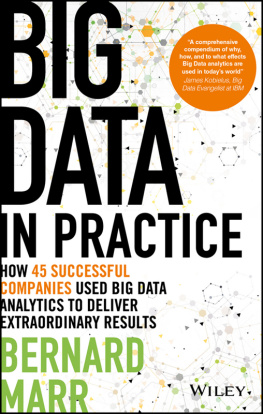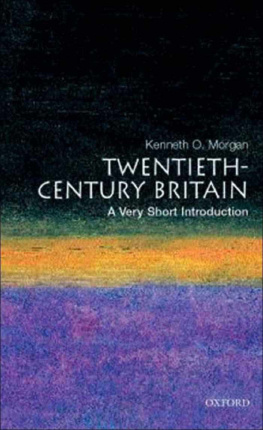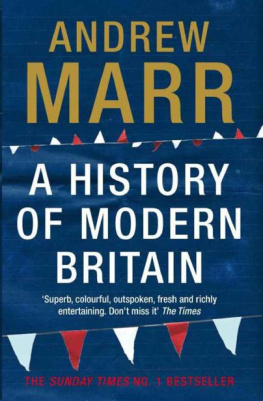Marr - A History of 20th Century Britain
Here you can read online Marr - A History of 20th Century Britain full text of the book (entire story) in english for free. Download pdf and epub, get meaning, cover and reviews about this ebook. year: 2017, publisher: Macmillan, genre: Politics. Description of the work, (preface) as well as reviews are available. Best literature library LitArk.com created for fans of good reading and offers a wide selection of genres:
Romance novel
Science fiction
Adventure
Detective
Science
History
Home and family
Prose
Art
Politics
Computer
Non-fiction
Religion
Business
Children
Humor
Choose a favorite category and find really read worthwhile books. Enjoy immersion in the world of imagination, feel the emotions of the characters or learn something new for yourself, make an fascinating discovery.
A History of 20th Century Britain: summary, description and annotation
We offer to read an annotation, description, summary or preface (depends on what the author of the book "A History of 20th Century Britain" wrote himself). If you haven't found the necessary information about the book — write in the comments, we will try to find it.
A History of 20th Century Britain — read online for free the complete book (whole text) full work
Below is the text of the book, divided by pages. System saving the place of the last page read, allows you to conveniently read the book "A History of 20th Century Britain" online for free, without having to search again every time where you left off. Put a bookmark, and you can go to the page where you finished reading at any time.
Font size:
Interval:
Bookmark:
MODERN BRITAIN
PAN BOOKS
Marrs writing is persuasive, liberal and energised... His grasp of recent politics and economics is superbly authoritative, never better than when discussing our changing relationship with the United States
Observer
Marr excels at brief, droll pen portraits of the major players. His language is vivid and powerful, enlivened with a sparky wit... Despite its great size, this is a stimulating and witty account of the forces that made our age by a man who somehow manages to be a well-informed insider without sacrificing the perspective of those outside the Westminster village. Its written from the perspective of someone who travels around the country, who thinks and who listens
Scotland on Sunday
Richer and deeper than television commentary can ever hope to be. As popular history, it is a lively and enjoyable, as well as a solid, achievement. He is fair and humane in his judgement of men and events
Daily Mail
As in the days when he was the BBCs chief political editor, it is the clarity of his judgements, the arresting insights and the irrepressible wit that keep us hanging on to his words... It is a measure of Marrs professionalism that his judgements inspire the kind of trust which Tony Blair and his allies squandered through spin and outright lies
Literary Review
Marr is shrewd enough to know that yet another irenic trot through what is in outline an overly familiar story may risk what he himself calls autistic repetitiveness. So his invigorating method is to adopt what you might call the Ben Schott approach to history, piling up interesting detail, often through quotation, and hoping, quite correctly, that it will do more work than windy generalisation
Guardian
Marr is, predictably, at his best when discussing politics, with his keen understanding of economic policy and his feel for the Westminster world of ambition, conspiracy and rivalry... he excels in providing compelling summaries of leading political figures
Sunday Telegraph
Marr has a gift for narrative and prcis, a pithy turn of phrase and an ability to unearth the unfamiliar, and he is passionately engaged with his subject
The Times
Part One
HUNGER AND PRIDE: BRITAIN AFTER THE WAR
Part Two
THE LAND OF LOST CONTENT
Part Three
HAROLD, TED AND JIM: WHEN THE MODERN FAILED
Part Four
THE BRITISH REVOLUTION
Part Five
NIPPY METRO PEOPLE: BRITAIN FROM 1990
One Year On
A year has passed since this book was first published in hardback. How much has changed? How do the judgements stand up? The big theme of the story that follows is the defeat of politics by shopping. The surging consumer economy has been by turns exhilarating, wasteful, liberating and narrowing. Nobody who escaped the grey years of rationing, queues and shortages should snootily dismiss the triumph of shopping; yet nobody who looks at our dead-eyed obsession with buy-and-throw newness can be comfortable either. Britains shopping economy, shorn of most of its industry, has produced a country which is more crowded, cleaner and richer (far richer) than it used to be, but which is also more vulnerable to shocks from outside. Consumerism has shouldered aside other ways of understanding the world real political visions, organized religion, a pulsing sense of national identity.
Yet during 2007, the biggest change was a darkening of the national mood. It is not just global warming, but a sense that the good times are not, after all, forever. The decade-long BlairBrown boom has been based on cheap imports from China, on very high levels of borrowing secured by upward-spiralling house prices, and on cheap, skilled migrant labour from Eastern Europe. None of these things are indefinitely sustainable. As this book shows, our recent prosperity is partly the achievement of politicians who are now almost forgotten. But after ten years in which New Labour had enjoyed the political fruits of strong, low-inflationary growth, many of us think we can see the buffers looming out of the mist.
This is recent. Early in 2007 house prices were still strongly rising. The stock market was at a six year high. Economists and opposition parties were warning about the government being overborrowed, and about private debt. But nobody paid much attention. In the City the big banks still reported huge profits. There were mysterious characters called private equity investors and hedge fund managers. Few people really understood what they were up to, except that it was all very clever and complicated. The banks were paying astronomical bonuses to their managers. And for the majority, in the shops, clothes and gizmos were ludicrously cheap. A Western economy based on high debt, both private and public, ensured cash was there to keep the spree going. But the intricate and always-shifting tangle of loans, bets, guesses and 80-proof, chill-filtered optimism that is modern global finance, was about to suffer a reality check. And if reality check is an ugly American phrase, then it is perhaps not as ugly as another which entered the Queens English in 2007. Sub prime is jargon for bad loans the mortgages and other pricey money offers to ordinary Americans who had no proper security and in many cases no way of paying it back. This overborrowing, mere greed by the banks, had been causing worries on Wall Street as early as February 2007. We have known since the Great Crash of 1929 that a global economy transmits problems from one country to another through the banking system very fast. We are supposed to have a stabler world trading system these days. But what has also changed is that bad debts have been bundled up and sold around like sacks of plastic casino counters between banks so many times that nobody knows just who is in trouble, and for how many billion dollars. In great US institutions like Merrill Lynch, Morgan Stanley and Citigroup, the one-time wizards started to lose their jobs.
Meanwhile back in Britain, its prime minister lost his. Tony Blair carried on working at strategic plans almost until the day he finally left Downing Street. It was as if he was still waiting for a final vindicating victory in Iraq or believed that if he could only nail down one last element of his programme to the cabinet table, his domestic legacy would be secured. But at last he went, in June 2007, telling the Commons: I wish everyone, friend and foe, well. And that is that. The End. Gordon Brown took over without the bloodbath or recriminations that had been so widely predicted. He promised to govern differently, to take the cabinet more seriously, and to be more inclusive, bringing in outsiders with police, military and business careers to advise him and Liberal Democrats too. To start with, all this was popular. Under Brown, Labour rose sharply in the polls and many Conservatives were dejected. Perhaps he would not turn out to be the disaster they had predicted. Their new leader David Cameron was attacked for being lightweight, the heir to Blair just when the country had had enough of Blair. There was muttering about replacing him. So there was too about Sir Menzies Campbell, who was attacked not for being in his sixties, but for looking as if he was. A sequence of crises, including terrorist attacks in Glasgow and London, widespread summer flooding and an outbreak of foot and mouth disease, seemed to show Brown as a decisive, rather traditional leader; and his position strengthened further.
Then, in the autumn of 2007, it all started to go wrong for him. By far the most ominous event was the revelation than an adventurous building society, based in the north-east of England, had been forced to go to the Bank of England for emergency support. What had happened to Northern Rock, Britains fifth-largest provider of mortgages, was the direct consequence of those sub-prime problems in America earlier in the year. Mud and ice were spreading through the Western banking system as banks, wondering how much bad debt others were exposed to, stopped lending readily to one another. The lubrication began to fail, and because Northern Rock had lent so much money so aggressively, it was first in trouble. Its bosses resigned, but not before the world had watched huge queues of people across Britain waiting to get their money out.
Font size:
Interval:
Bookmark:
Similar books «A History of 20th Century Britain»
Look at similar books to A History of 20th Century Britain. We have selected literature similar in name and meaning in the hope of providing readers with more options to find new, interesting, not yet read works.
Discussion, reviews of the book A History of 20th Century Britain and just readers' own opinions. Leave your comments, write what you think about the work, its meaning or the main characters. Specify what exactly you liked and what you didn't like, and why you think so.

















